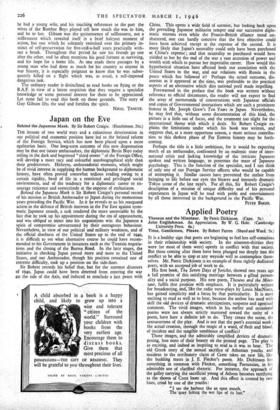Japan on the Eve
Behind the Japanese Mask. By Sir Robert Craigie. (Hutchinson. 21s.)
THE lessons of two world wars and a calamitous deterioration in our political and economic position have led to the belated reform of the Foreign Service, which has now been placed upon a more egalitarian basis. One long-term outcome of this new dispensation may be that our future ambassadors the diplomatic Bevin Boys today toiling in the dark and begrimed "third rooms" of the Foreign Office, will develop a more racy and colourful autobiographical style than their predecessors. Hitherto, ambassadorial memoirs, which might be of vivid interest in supplying the human background to diplomatic history, have often proved somewhat tedious reading owing to a certain rigidity, bred of life in a restricted and privileged social environment, and of the tendency for a diplomatic career to en- courage reticence and correctitude at the expense of enthusiasm.
Behind the 7apanese Mask is Sir Robert Craigie's personal record of his mission as British Ambassador to Japan during the momentous years preceding the Pacific War. In it he reveals to us his rearguard action in the defence of British interests in the Far East against syste- matic Japanese assault, a task rendered the more unenviable by the fact that he took up his appointment during the era of appeasement, and was obliged to inject into his negotiations wit. the Japanese a spirit of compromise unwarranted by their outrageous behaviour. Nevertheless, in view of our political and military weakness, and of the official aloofness of the United States up to the end of 1940, it is difficult to see what alternative course he could have recom- mended to his Government in instances such as the Tientsin negotia- tions and the closing of the Burma Road. In the later stages, the initiative in checking Japan passed more and more to the United States, and our Ambassador, though his position remained one of extreme difficulty, took up a position on the side-lines.
Sir Robert records his belief that, but for the summer disasters of 1940, Japan could have been deterred from entering the war on the side of the Axis, and induced to conclude a just peace with China. This opens a wide field of surmise, but looking back upon the prevailing Japanese militarist temper and our successive diplo- matic retreats even while the Franco-British alliance stood un- shattered, one can hardly conceive that the first objective could have been achieved except at the expense of the second. It is more likely that Japan's neutrality could only have been purchased at China's expense and that neutrality so purchased would have yielded to her by the end of the war a vast accretion of power and wealth with which to pursue her imperialist career. How would this hypothetical situation have affected both our association with the United States in the war, and our relations with Russia in the peace which has followed it? Perhaps the actual outcome, dis- astrous as it appeared at the time, was preferable to the practical aspects of an alternative which dire national peril made impelling. Forewarned in the preface that the book was written without reference to official documents, the reader will not expect to find the array of memoranda of conversations with Japanese officials and copies of Governmental instructions which are such a prominent
feature in Mr.- Grew's Ten Years in 7apan. Nevertheless,
he may feel tat, without some documentation of this kind, the picture is a little out of focus, and the treatment too slight for the international theme with which it deals. Sir Robert Craigie ex- plains the limitations under which • his book was written, and suggests that, at a more opportune season, a more serious contribu- tion to this darkest phase of Far Eastern history may be forth- coming.
Perhaps the tide is a little ambitious, for it would be expecting much of an ambassador, confronted by an endemic state of inter- national crisis and lacking knowledge of the intricate Japanese spoken and written language, to penetrate the maze of Japanese psychology. This is the function of the specialist, and I can think of only one of our Foreign Service officers who would be capable of attempting it. Similar causes have prevented the author from bringing to life before our eyes the bizarre and intensely dramatic Tokyo scene of the late 1930's. • For all this, Sir Robert Craigie's description of a mission of unique difficulty and of his personal experiences in Japan will be read with profit and entertainment by all those interested in the background to the Pacific War.
PETER BAKER.


























 Previous page
Previous page